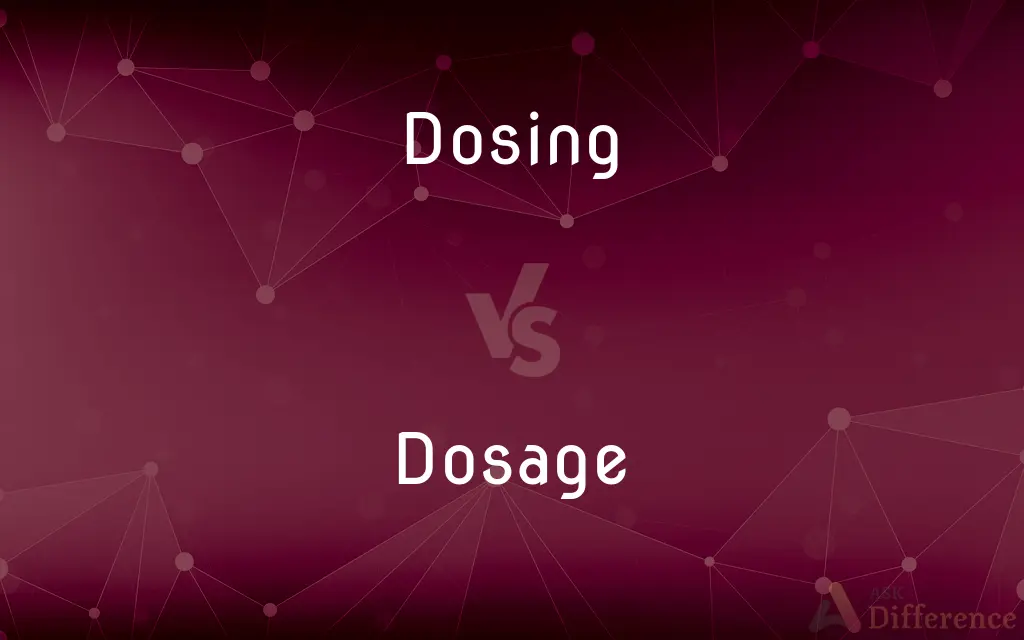Dosing vs. Dosage — What's the Difference?
By Tayyaba Rehman & Urooj Arif — Updated on April 24, 2024
Dosing refers to the act of administering a drug or substance, while dosage indicates the size or frequency of a dose, determined by specific criteria.

Difference Between Dosing and Dosage
Table of Contents
ADVERTISEMENT
Key Differences
Dosing is the act of giving a dose, typically involving the actual delivery of a medication at prescribed intervals, whereas dosage is the prescribed amount and schedule of that medication.
The process of dosing can vary depending on the route of administration, such as oral, intravenous, or topical, highlighting how the medication is delivered, whereas dosage involves the precise amount and timing recommended by healthcare providers.
Dosing is crucial for the effectiveness of treatment regimes, focusing on how medications are administered to ensure therapeutic levels in the body, whereas dosage is critical in planning treatment to avoid toxicity or underdosing.
In clinical settings, dosing is adjusted based on individual patient needs and responses, requiring careful monitoring and possibly changes over time, whereas dosage is often established based on general guidelines and then tailored to individual circumstances.
Dosing errors can lead to adverse effects or diminished efficacy of treatment, emphasizing the importance of accurate administration, whereas incorrect dosage adjustments can result from misunderstanding the prescribed amounts and frequencies.
ADVERTISEMENT
Comparison Chart
Definition
The act of administering a prescribed quantity of medication.
The prescribed quantity and schedule of a medication.
Part of Speech
Verb (also used as a noun)
Noun
Usage Context
Medical administration, treatment regimen.
Medical prescription, treatment planning.
Examples in Sentences
"The nurse is responsible for dosing the patient with their medication."
"The dosage of the medication depends on the patient’s weight and age."
Related Terms
Administer, deliver, apply.
Amount, schedule, regimen.
Compare with Definitions
Dosing
To administer a precise amount of a substance at regular intervals.
The machine automates dosing for precise chemical reactions.
Dosage
A specified regimen of medication intake.
His dosage schedule required taking the medication three times a day.
Dosing
The action of administering a drug in specified amounts at specified intervals.
Dosing instructions were carefully followed to maintain the drug’s effectiveness.
Dosage
The quantity of medicine prescribed to be taken at one time.
The dosage of the pain reliever should not exceed four pills per day.
Dosing
To give a dose of a liquid or substance to someone or something.
The farmer was dosing his livestock with antibiotics.
Dosage
The determination of the appropriate amount of medication to be taken at one time.
The doctor adjusted the dosage of her prescription.
Dosing
The process by which a drug is given to achieve therapeutic levels.
The patient required dosing adjustments based on their response to the treatment.
Dosage
The size or frequency of a dose, part of a treatment plan.
Dosage considerations are particularly important in pediatric care.
Dosing
To provide a specified quantity of medication to a patient.
He was responsible for dosing his own insulin.
Dosage
The prescribed amount of drug in a medical treatment.
She consulted the pharmacist about the correct dosage for her condition.
Dosing
Dosing generally applies to feeding chemicals or medicines when used in small quantities. For medicines the term dose is generally used.
Dosage
Administration of a therapeutic agent in prescribed amounts.
Dosing
A specified quantity of a therapeutic agent, such as medicine, prescribed to be taken at one time or at stated intervals.
Dosage
Determination of the amount to be so administered.
Dosing
The amount of radiation administered as therapy to a given site.
Dosage
The amount so administered.
Dosing
An ingredient added, especially to wine, to impart flavor or strength.
Dosage
Addition of an ingredient to a substance in a specific amount, especially to wine.
Dosing
An amount, especially of something unpleasant, to which one is subjected
A dose of hard luck.
Dosage
The administration of a medication etc, in a measured amount; dosing.
Dosing
(Slang) A venereal infection.
Dosage
The addition of a small measured amount of a substance to something, e.g. sugar to wine.
Dosing
To give (someone) a dose, as of medicine.
Dosage
The measured amount so administered or added; the dose.
Dosing
To give or prescribe (medicine) in specified amounts.
Dosage
The administration of medicine in doses; specif., a scheme or system of grading doses of medicine according to age, etc.
Dosing
Present participle of dose
Dosage
The process of adding some ingredient, as to wine, to give flavor, character, or strength.
Dosing
The administration of a dose
Dosage
Same as dose{1}; as, 200 mg q.i.d.
Dosage
The quantity of a medicine or other substance given to an animal, expressed as a quantity per body weight; as, use a dosage of 10 milligrams per kilogram
Dosage
The quantity of radiation given to or absorbed by an object; as, a maximum dosage of 1 mrad per day is allowed.
Dosage
The quantity of an active agent (substance or radiation) taken in or absorbed at any one time
Common Curiosities
What is the difference between dosing and dosage?
Dosing refers to the administration of a dose, while dosage is the prescribed amount and frequency of doses.
Is it possible to adjust the dosage during treatment?
Yes, dosages can be adjusted based on the patient’s response to the treatment or changes in their condition.
Can dosage vary from person to person?
Yes, dosage can vary based on factors like age, weight, and overall health condition.
Can dosing frequency affect treatment outcomes?
Yes, both the amount and frequency of dosing can significantly affect the effectiveness and safety of the treatment.
What role does dosage play in medication safety?
Proper dosage helps prevent toxicity and ensures that medication is effective without being dangerous.
How do medical professionals ensure proper dosing?
Medical professionals use dosing guidelines, monitor patient response, and adjust as necessary to ensure proper dosing.
Why is understanding dosage important for patients?
Understanding dosage ensures that patients take their medication correctly and safely.
How important is accurate dosing?
Accurate dosing is crucial for achieving the desired therapeutic effect and avoiding potential side effects.
What happens if there is a dosing error?
Dosing errors can lead to underdosing or overdosing, both of which can be harmful or reduce treatment efficacy.
What should one consider when determining dosage?
Factors to consider include the drug’s properties, the patient’s medical history, and the intended treatment outcome.
Are dosing and dosage specific to medications?
Primarily, though dosing can also apply to other substances like chemicals in industrial settings.
What is a common mistake in medication dosing?
Common mistakes include taking incorrect amounts or dosing at incorrect times.
What tools can help with accurate dosing?
Tools like dosing calculators, measuring devices, and medication management apps can help ensure accuracy.
How are dosing schedules determined?
Dosing schedules are typically determined by the medication’s absorption rate, the condition being treated, and patient factors.
Can non-medical substances have dosages?
Yes, substances like vitamins, supplements, and even some foods can have recommended dosages.
Share Your Discovery

Previous Comparison
Expected vs. Expectable
Next Comparison
Cereal vs. SoupAuthor Spotlight
Written by
Tayyaba RehmanTayyaba Rehman is a distinguished writer, currently serving as a primary contributor to askdifference.com. As a researcher in semantics and etymology, Tayyaba's passion for the complexity of languages and their distinctions has found a perfect home on the platform. Tayyaba delves into the intricacies of language, distinguishing between commonly confused words and phrases, thereby providing clarity for readers worldwide.
Co-written by
Urooj ArifUrooj is a skilled content writer at Ask Difference, known for her exceptional ability to simplify complex topics into engaging and informative content. With a passion for research and a flair for clear, concise writing, she consistently delivers articles that resonate with our diverse audience.














































